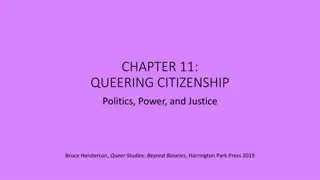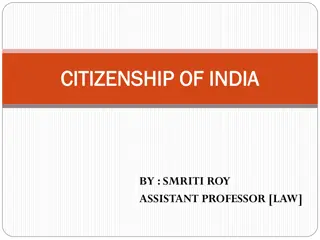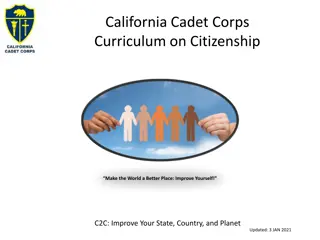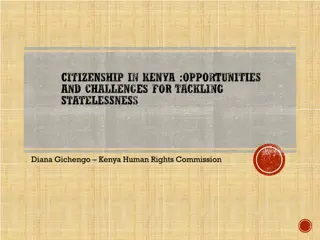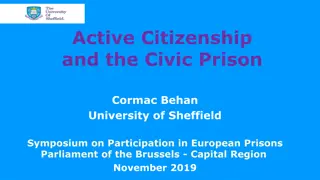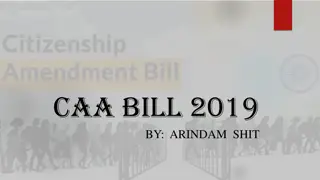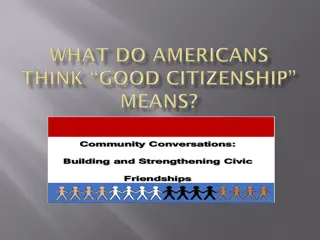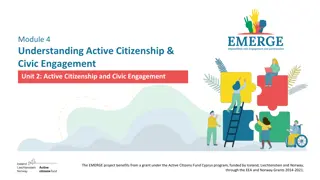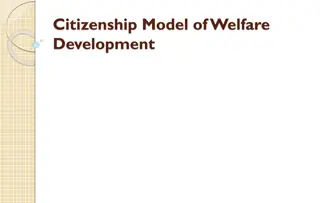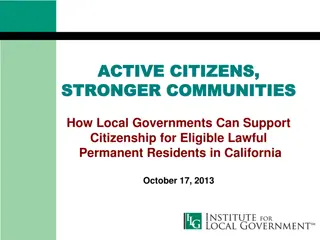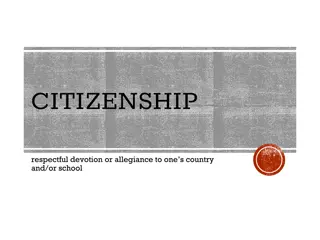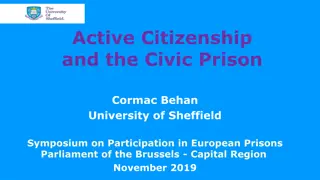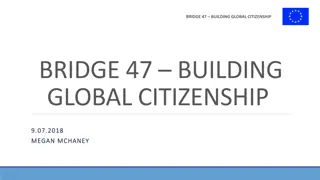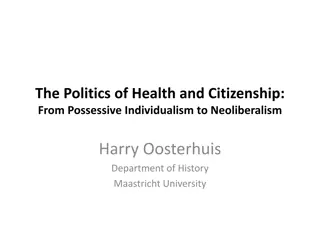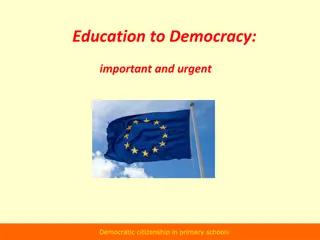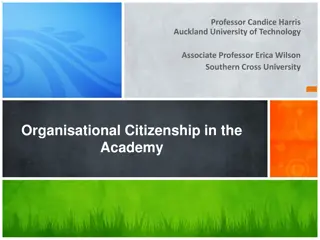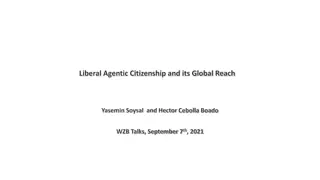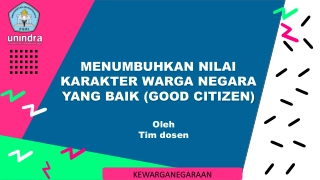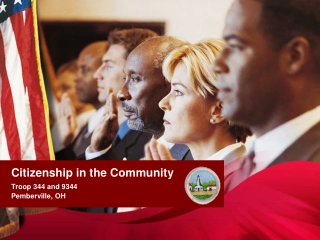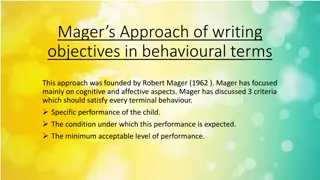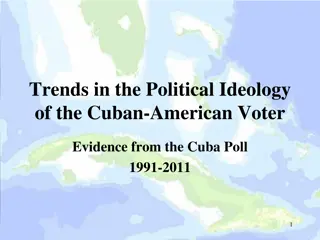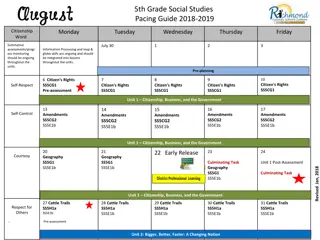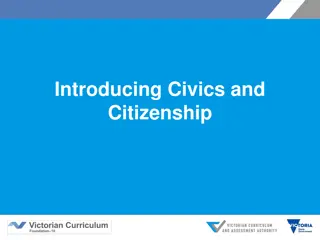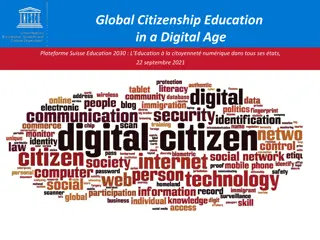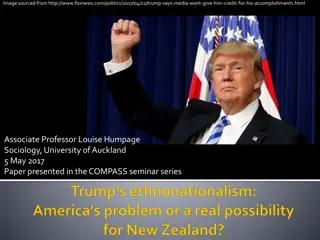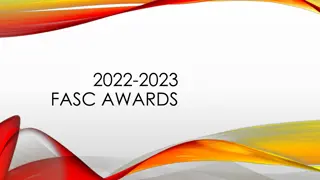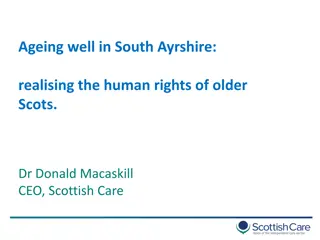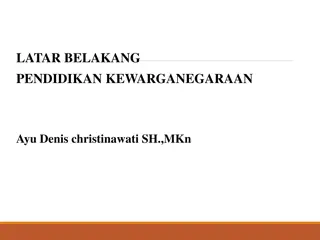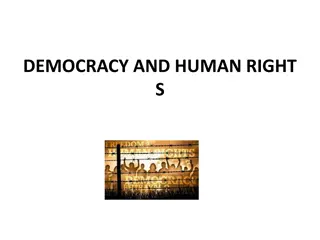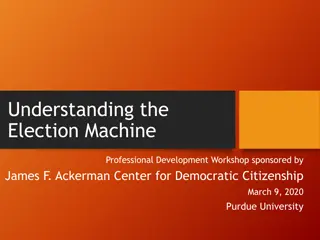Complete Guide to US Citizenship and Naturalization Process
Discover essential information on US citizenship and the naturalization process, including common acronyms, ways to obtain citizenship, benefits of becoming a US citizen, steps to apply for naturalization, and key details about the N-400 form. Learn about the significant advantages of US citizenship and the necessary requirements to become a citizen. Explore the naturalization process for foreign nationals and important considerations before applying.
Download Presentation

Please find below an Image/Link to download the presentation.
The content on the website is provided AS IS for your information and personal use only. It may not be sold, licensed, or shared on other websites without obtaining consent from the author. Download presentation by click this link. If you encounter any issues during the download, it is possible that the publisher has removed the file from their server.
E N D
Presentation Transcript
Naturalization & Citizenship Kelly Becker-Smith Senior Immigration Attorney Immigration Intervention Project Sanctuary for Families
Common Acronyms and Abbreviations USCIS/CIS = United States Citizenship and Immigration Services USC = United States Citizen LPR = Lawful Permanent Resident ( green card ) INA = Immigration and Nationality Act Natz = Naturalization
Ways of Obtaining US Citizenship Birth in the US Acquisition of citizenship at birth Derivation of citizenship INA Section 322 Naturalization
Benefits of US Citizenship Vote in Federal elections Travel with a U.S. Passport Run for office where citizenship is required Serve on a jury Become eligible for federal and certain law enforcement jobs Obtain certain state and federal benefits not available to noncitizens Obtain citizenship for minor children born abroad Expand and expedite ability to bring family members to the United States
How to Apply for Naturalization Fill out form N-400 Copy of front & back of green card 2 passport pictures if name change desired Fee of $725 or fee waiver request (form I-912) If applying as spouse of USC, need to submit proof of marriage and living in marital union Copies of all current and previous marriage and divorce certificates/judgements Copies of all certificates of disposition to document criminal history
Naturalization Form N-400 Only 12/23/2016 edition accepted (edition date shown in lower left corner of each page)
Naturalization Process by which foreign national can become a US Citizen Need to rule out acquisition/derivation before proceeding with Natz application because USCIS does not have jurisdiction to naturalize someone who is already a citizen Watch for applicants with USC parents. If parent became a USC before the applicant turned 18, applicant may have derived citizenship
Basic Process 1. Meet Eligibility Requirements 2. Complete and File Form N-400 3. Attend Biometrics Appointment (fingerprints and photo) 4. Pass Interview (English and civics exam) 5. Take Oath of Allegiance
Requirements for Naturalization INA 316; 8 CFR 316 18 years old Lawful permanent resident (LPR) 5 or 3 years continuous residence* Physical presence for half of the 3 or 5 years Resided for 3 months in state or USCIS district where application is filed Good moral character (GMC)** Knowledge of English & US history/civics Take oath of allegiance to US *3 years continuous if married to and living with US citizen for the last three years ** GMC is a complicated and vast concept involving analysis of the applicant s entire life, including criminal, personal, tax, immigration history, etc.
>18 years of age 18 years old At least 18 years of age (unless age requirement waived due to military involvement)
LPR Applicant must be a Lawful Permanent Resident (green card) Conditional LPR may be eligible if s/he has accrued requisite residence period even if condition not yet lifted Look at date LPR status granted When person honorably served in military during time of war or declared hostilities, LPR status not required at time of application www.sanctuaryforfamilies.org
5 Year Rule Generally need to have held lawful permanent resident status for 5 years
Exceptions to 5 year Rule Special rule for spouses of USC. Can apply after 3 years if: LPR for 3 years Married and living in marital union with USC spouse (up to time of oath). Spouse must have been USC for at least 3 years
Exceptions to 5 year Rule Also 3 year rule for VAWA grantees (obtained LPR status as battered spouse/child of USC) INA 319 Part 1, Information About Your Eligibility, check box E for other. As an explanation, write "Have been an LPR for at least three years (VAWA I.N.A 319(a))." Look for category IB1 or IB6
Continuous Residence & Absences Must have (3/5 years) of continuous residence in the US as an LPR Can apply 90 days before 4 years 9 months 2 years 9 months if married to U.S. citizen for that entire period
Continuous Residence & Absences 1 year absence breaks continuous residence have to wait 4 years and 1 day from when returned to US. Or two years and 1 day if applying under 3 year rule Absences > 6 mo but < 1 yr create a presumption of breaking continuous residence. Overcome presumption by showing kept home & employment in US, family ties in US, not employed abroad. If USCIS determines continuous residence was broken, applicant must wait 3 or 5 years.
Continuous Residence & Absences Example: George left the U.S. on 05/01/2016 and returned on 05/02/2017. He broke continuous residence and cannot apply until: 05/03/2021 generally (4 years and 1 day after return) 05/03/2019 if married to a U.S. citizen (2 years and 1 day after return)
Continuous Residence & Absences Example: George left the U.S. on 05/01/2016 and returned on 11/02/2016. He must overcome presumption of breaking continuous residence. Some evidence he could present: Apartment lease and proof of rent payments Insurance he maintained (car, apartment, etc.) Tax returns filed Letter from employer who held job for him School transcripts or enrollment verification Be creative!
Abandonment of Permanent Residence Watch out for abandonment issues. Matter of Kane, 15 I&N 258 (BIA 1975). Long absences (>6 months) can create a presumption that abandoned residence & trigger deportation proceedings Reentry permit (I-131) is an option for those that need to be absent for long periods (due to school, work, etc) If emergencies developed, need to show did not intent to abandon residence (documenting emergency, show kept ties to US, employment, home, family ties, etc) Totality of circumstances and intent are key
Physical Presence INA 316 & 8 CFR 316.2(a)(4) Must have been physically present in the US for half of the 5 year period (at least 913 days in US) If applying under 3 year rule for spouses of USC or VAWA grantees, then half of the 3 years (at least 548 days in US)
Physical Presence Must include every trip outside of the US in the last 3/5 years If outside US less than 24 hours, do not include e.g. lunch at Niagara Falls Do not count the departure date e.g. 10/01/2018 to 10/15/2018 = 14 days
3 Months Residence 3 months residence in the CIS district or State where applying for naturalizaton Definition at INA101(a)(33) Place of general abode Principal, actual dwelling place, without regard to intent All five boroughs, Long Island, and Westchester are one district, so can move within area www.sanctuaryforfamilies.org
Name Change Applicants have the opportunity to legally change name. Must note desired name on Page 2 of application Client must submit two photos or bring two to interview Must attest that name change is not to avoid creditors or criminal/civil proceedings Must sign Naturalization Certificate with new name www.sanctuaryforfamilies.org
English & History/Civics Exam English language exam: written and spoken Test requires applicant to read an English sentence aloud, write an English sentence that is dictated, and answer questions in English about information in the application Can get exemption due to disability or if long term LPR and at least 50 years old If exempt from language requirement, there is no writing or reading test No exemption due to illiteracy/inability to read/write
English & History/Civics Exam Knowledge of US History/Civics Tested by asking 10 of 100 questions. Need to answer 6 correctly to pass. If language exempt, can take civics exam in preferred language Applicants that are 65 years old and have 20 years of LPR status get easier test (only 20 questions to learn)
Language Exemption 26 For long term LPRs 55/15 Rule: at least 55 years old and 15 years of LPR at time of applying 50/20 Rule: at least 50 years old and 20 years of LPR at time of applying How to accommodate uncommon languages? Give USCIS an heads-up in cover letter. NY offices are pretty good at accommodating Bring own interpreter
Simplified Civics 65/20 65 years or older and have lived in the US as a LPR for periods totaling at least 20 years Simplified civics test: only required to study 20 of the 100 civics test questions
Disability Waiver (N-648) 28 Written request to waive English/Civics exam because of physical or mental impairment Need physician to testify in writing as to the medical condition Must demonstrate NEXUS between condition and inability to learn English/Civics Old age alone is not enough, but dementia or damage due to stroke might be N-648 must have been filled out less than 6 months at time of submission.
Loyalty Oath Everyone must take oath swearing allegiance to the constitution and loyalty to the US Exception for people with a disability that makes it impossible to understand oath Modified oath for religious reasons or conscientious objectors to war Need letter documenting religious belief Will give modified oath
Good Moral Character (GMC) INA 101(f), INA 318 Need to demonstrate GMC during 5 yrs/3yrs Most important part of the analysis because the applicant s entire life will be up for review Factors that affect GMC are generally: Criminal history Tax history Immigration history Marriages/Children Voting issues
Review Immigration History How LPR obtained status? Watch out for red flags Short term marriages to petitioning spouse Children outside marriage Short term employment at petitioning employer Was there any fraud in immigration process? Might be discovered and jeopardize applicant s status.
GMC Analysis: 3 Steps 1. Is the applicant removable/deportable? See grounds of deportability at INA 237, including: Criminal convictions* Alien smuggling Illegal voting False claims to USC Abandonment of LPR status Any fraud/misrepresentation in past applications Inadmissible at time of entry/adjustment (INA 237(a)(1)(A) *Very complex subject. Please feel free to contact me for more in-depth discussion.
GMC Analysis continued 2. Are there any bars to demonstrating GMC? a) Permanent Bars to GMC: Murder, aggravated felonies after 11/29/1990, persecution, genocide, torture of others b) Conditional Bars (for acts during statutory period of 3/5 years) - Certain criminal convictions/conduct. Ex Probation - Habitual drunkard (watch out for DUIs) & illegal gambling - Alien Smuggling - False testimony under oath in seeking immigration benefit - Failure to support dependents & adultery - Unlawful acts: illegal voting, claim to USC, failure to file income tax returns, failure to register for selective service
GMC Analysis conti nued 3. Likelihood that applicant will demonstrate GMC? Conduct outside statutory period still counts (to negate rehabilitation for example), but cannot be sole reason to deny. See Santamaria Ames v INS, 194 F.3d 883 (9th Cir. 1996) and Petition of Zele, 140 F.2d 773 (2n Cir 1948). CIS will do balancing test: negative GMC factors v. positive ones. Determined on a case by case basis. If not removable, then only risks denial of application (time & money) and can apply again later if denied (accumulate clean statutory period).
Probation or Parole 8 CFR 316.10 (c)(1) Probation/Parole will not preclude applicant from demonstrating GMC BUT CIS will not grant if still on parole/probation Probation/parole means there s a criminal conviction that could trigger deportability. Even if probation/parole is over, CIS might take into account (balancing factors).
Alien Smuggling An applicant shall be found to lack good moral character if during the statutory period was involved in the smuggling of a person 8 CFR 316.10(b)(2)(viii) Conviction not required. Paying a coyote or encouraging illegal entry is enough. Alien smuggling makes someone deportable Also, is a ground of inadmissibility. Even if this is waived, still precludes from showing GMC.
Failure to Pay Child Support Unless the applicant establishes extenuating circumstances shall be found to lack good moral character if, during the statutory period [w]illfuly failed or refused to support dependents. 8 CFR 316.10(b)(3)(i) Key is willful and extenuating circumstances such as unemployment and financially unable to pay. Also, cannot locate family or refuses child support. If providing support, be ready to show proof.
Other Unlawful Acts 8 CFR 316.10(b)(3)(iii): catch-all provision for unlawful acts that are not covered by statute but reflect on GMC. An applicant who has committed, was convicted, or imprisoned for an unlawful act or acts during the GMC period may be found to lack GMC This provision does not require the applicant to have been charged or convicted of the offense .An unlawful act includes any act that is against the law, illegal or against moral or ethical standards of the community. USCIS Policy Manual Vol. 12, Part F, Ch. 5
Other Unlawful Acts: Examples Fraudulent receipt of public benefits Not reporting earning accurately or extensive travel abroad while on welfare Failure to file and/or pay income taxes when obligated Self-employed still required to file taxes Watch out for married head of households If owes taxes, needs to be on payment plan
Other Unlawful Acts: Examples Failure to register with Selective Service All males between 18-26 must register (including undocumented males) If willfully & knowingly refuses, no GMC
Illegal Voting/False Claims to USC False claim to USC after 9/30/1996 = deportable Narrow exception for LPR children that reasonably believe they were USCs Policy exception for minors who were under 18 and lacked capacity to understand Unlawful voting: If voted and claimed USC on voting registration, alien is deportable unless exception applies under INA 212(a) or 237(a) Adjudicator may apply prosecutorial discretion not to issue NTA If not NTA, must decide GMC via balancing test
Naturalization Process Two to three weeks after submission: USCIS will issue notice with receipt number (use to check status online) One month later: applicant will be scheduled for biometrics appointment (fingerprints and photo) At Interview (within 6 months of application): Review N-400 for accuracy & changes English/Civics test Review of original documents: birth/marriage certificates, dispositions, tax returns, etc Officer might request additional evidence
Oath Ceremony Even if approved, not a citizen until applicant has taken oath (legal ceremony). Same for name change. Must disclose any changes at time of oath (fill out form). If arrested between interview & oath, might change eligibility. Must surrender green card but will receive certificate of naturalization.
Current Processing Time As of October 1, 2018: Brooklyn: 13.5-16 months Queens: 11-17.5 months Manhattan, Bronx, Staten Island, Westchester: 11.5-22 months Long Island: 9-15.5 months Newark: 9-14 months www.sanctuaryforfamilies.org
N-336 If denied, can re-file or request a hearing on the decision www.sanctuaryforfamilies.org
Fee Waiver Form I-912: full fee waiver. Three options: Earns <150% of federal poverty level (FPL) Receives means tested benefit e.g. SNAP, Medicaid, Essential Plans 2-4, Supplemental Social Security Income (not Social Security Disability) Financial hardship www.sanctuaryforfamilies.org
Reduced Filing Fee Form I-942: reduced filing fee of $405 For applicants earning between 150 and 200% of FPL Need to include proof of income, like paystubs and most recent taxes, OR Need to show receipt of Essential Plan 1 (Medicaid expansion) www.sanctuaryforfamilies.org
Resources www.uscis.gov USCIS Policy Manual, Chapter 12: Citizenship & Naturalization Citizenship Resource Center Naturalization Interview & Test Videos
Thank you Kelly Becker-Smith Senior Staff Attorney Immigration Intervention Project Sanctuary for Families 30 Wall Street, 8th Floor New York, NY 10005 kbeckersmith@sffny.org sanctuaryforfamilies.org www.sanctuaryforfamilies.org


